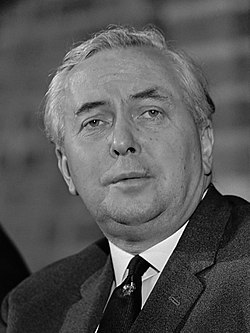Controversy
The list caused controversy as a number of recipients were wealthy businessmen whose principles were considered antithetical to those held by the Labour Party at the time.
Roy Jenkins notes that Wilson's retirement "was disfigured by his, at best, eccentric resignation honours list, which gave peerages or knighthoods to some adventurous business gentlemen, several of whom were close neither to him nor to the Labour Party." [3]
One businessman on the list, Lord Kagan, was convicted of fraud in 1980; Sir Eric Miller committed suicide while under investigation for fraud in 1977. Another beneficiary was the buccaneering financier James Goldsmith. Nearly all of the other names on the list such as actor John Mills were, however, uncontroversial. Dismissing the notoriety of these two names, both of Wilson's academic biographers, Professor Ben Pimlott and Philip Ziegler, writing in the 1990s long after the purported events stress that there was never any question at the time or subsequently of financial impropriety in the drawing up of the list.
The origin of the name "Lavender List" derived from the claim made by former press secretary and journalist Joe Haines that the head of Wilson's political office, Lady Falkender, had written the original draft on lavender-coloured notepaper. No documentary evidence has been proffered to support this claim and Wilson and Falkender denied it. Joe Haines expressly denied any financial impropriety in the compilation of the list on national television in an interview on BBC's Panorama on 14 February 1977. In 2001 Joe Haines altered his allegations with an entirely new version of the "Lavender List". Lady Falkender sued Joe Haines for libel in 2007 over the statement that she was the author of the list. Many statements in the media were subject to litigation by both Wilson and Falkender during the 1970s, which later gave rise to a long complaint by Wilson published in The Times that his administration had been subject to an alleged smear campaign. Wilson's suspicions were later partially corroborated by former MI5 Assistant Director Peter Wright in his book Spycatcher , a book that was initially banned from publication in the UK.
According to a letter from Edith Summerskill published in The Times on 27 May 1977, the members of the Political Honours Scrutiny Committee "were astounded when we read the list of proposed honours. We told the civil servant present that we could not approve of at least half of the list, and would he see that this was conveyed to the Prime Minister", and that "it astonished us to find that, with one exception, the original list of recipients was published unchanged." But she comments that "we were in fact faced with a fait accompli which we had no power to upset." [4]
This page is based on this
Wikipedia article Text is available under the
CC BY-SA 4.0 license; additional terms may apply.
Images, videos and audio are available under their respective licenses.

